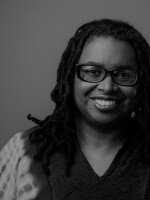For many in the transgender community, use of their birth name to refer to them after they have transitioned is a no-no, a sign of disrespect.
But Merrique Jenson, a transgender woman working in the LGBTQ community, knows she is in a unique situation. She started her transition in October, but she is best known, both in Kansas City and nationally, as Randall Jenson.
A recent study estimated that there are approximately 1.4 million transgender adults in America.
We sat with Merrique Jenson, 35, to ask her how her personal journey intersects with the work she does in LGBTQ community.

JOHNSON: You had worked in the LGBTQ community for years, particular with young people. What prompted you to begin your own transition.
JENSON: A woman at a conference in Albany, New York, last October asking me “Are you happy being a boy?”
JOHNSON: What happened next?
JENSON: I looked at her, and what was supposed to be a short answer became an hour-and-a-half long answer. I’m ready to be more of who I am, so I started hormones after this conversation with this amazing woman.
JOHNSON: What kind of work have you done in the LGBTQ community?
JENSON: I’ve worked on multimedia projects as a filmmaker, along with consulting and coaching, with a focus on the LGBTQ and communities of color. I have my own business called SocialScope Productions. I’m program director for Transformations, a social and support group for transgender and gender-expansive youth. The dating app Bumble announced last month that it was donating up to $20,000 to Transformations to help start a girl's youth group led by trans women of color.
JOHNSON: Do you think there was a certain degree of privilege you benefitted from in people perceiving you as white and male before?
JENSON: People had seen me previously as this like uppity gay white boy, and now they’re seeing me like this, hopefully, very sexy Latina woman. And I haven’t changed. It’s just somehow, literally, the phenotype, the features that I have and how they translate for people, especially in the Midwest. I’ve been brought all across the country. And I keynoted Yale University’s Pride Month. I’ve been on Oprah. Who knows if maybe I would have had them if I had transitioned sooner?
JOHNSON: What have been among your biggest influences in learning about and experiencing gender and identity?

JENSON: So for me, gender was always something that both was complicated and at the same time really not complicated at all. My background is double majoring in anthropology and women and gender studies. I was around really amazing critical feminist theorists and strong women and strong women of color and strong queer women, who really helped shape me in college.
This story is part of Sharing America Profiles — a series about women of color doing local work that highlights an issue of national importance. https://www.stlpublicradio.org/projects/profiles/
Michelle Tyrene Johnson is a reporter at KCUR 89.3 and part of the public radio collaborative Sharing America, covering the intersection of race, identity and culture. This initiative, funded by the Corporation for Public Broadcasting, includes reporters in Kansas City, St. Louis, Hartford, Connecticut and Portland, Oregon. She can be contacted at michelle@kcur.org.




